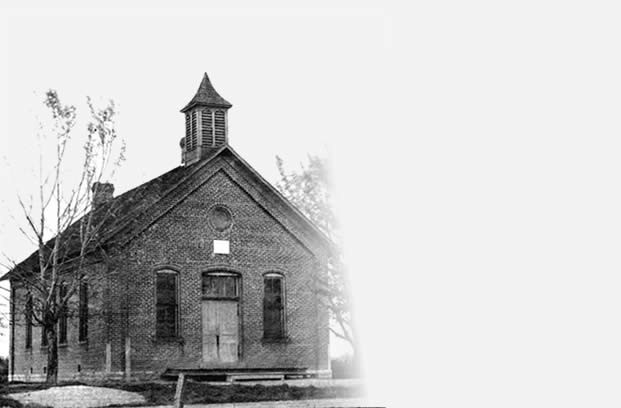Henry O. Kuck Recalls Memories of His Grandfather, Rev. F. H. W. Kuckherman, First Pastor of New Knoxville Reformed Church
Henry O. Kuck of New Knoxville, retired farmer and community-minded citizen is today finding the village of New Knoxville gradually surrounding his farm at the Southeast village limits. New Knoxville is either one year older or one year younger than Chicago, I am told. But if New Knoxville had experienced the growth of Chicago, Mr. Kuck’s farm might today be in the Loop, or somewhere thereabout. Why did Chicago grow in so spectacular a fashion? Of course its strategic location as a gateway for the West with its convergence of railroad and steamship lines, together with business ambition and investments by Eastern monied interests, largely account for it. But to develop a large city was farthest from the minds of the early settlers. Our interview with Mr. Kuck gave us a new understanding of the New Knoxville community and he is uniquely qualified to give the community background.
Mr. Kuck’s mother died when he was 7 days old. Thereupon he was raised and grew to manhood in the home of his grandfather, the late pioneer Pastor F. H. W. Kuckherman who was the venerable pastor of the First Evangelical and Reformed church there from 1844 to1890. As a lad he was thrilled to accompany his grandfather on his pastoral calls into the country and when he became older, to be his livery man, taking care of his horse and buggy, punctually having the rig ready and in the driveway at the appointed time where he would be as punctually met by his grandfather. Young Mr. Kuck would do the driving. At funerals his grandfather especially appreciated these services. In summer, because bodies were not embalmed in those days, interment took place before the services were held in the church, and the services would sometimes get lengthy. Mr. Kuck would then take his grandfather to church after the interment and then take the horse and buggy home.
Trips into the country would include a Sunday afternoon visit at least once a month to the “Kapellla”—the chapel which the New Knoxville congregation erected for Sunday School purposes on a half acre site on the Henry Eversman farm, adjacent to the William Rodeheffer farm, three miles North and a quarter mile East of New Knoxville. The residents of that area found the time too short and the exertion for their horses too much, to drive to New Knoxville in the morning, back again for Sunday School in the afternoon, and back again for church in the evening. The chapel filled a needed purpose from 1901 to 1919 when the advent of the automobile enabled all to attend the parent Sunday School at New Knoxville. On these and other trips a kamaraderie developed between them and Pastor Kuckherman would often relate experiences and facts which makes Mr. Kuck well informed on local community and church history and antecedents.
He recalled his grandfather telling of life in the country, specifically, his home community, Ladbergen, Westphalia, Germany. It was a truly devout community where religious activities were in progress and attended Sunday morning, afternoon and evening. But economic disaster threatened. The population had reached the saturation point. With the best of then-known methods the land could not produce sufficient to sustain the growing population. A few families from there had emigrated to Ohio, settling in the woods of what is now the New Knoxville community. They literally hewed their homes out of the virgin forest. Glowing reports came back to the home community in the old country. “The settlers in America have abundance!”
Recital of the foregoing launched us into a broad field of discussion in the economic and domestic realm. We discussed “What constitutes abundance?” “When is a family wealthy or well-off?” I recalled the couplet, “Say not that a man has wealth; Till you know the state of his conscience—and health!”, and also a poem by Clara M. Bode in “Out of My Heart” entitled “You’re rich, If there’s a happy home, a job to match your skill, if you can sleep the whole night through, etc.”
By comparison the economic status of the emigrants was one of abundance, actually of wealth, compared to the homeland. By present day standards our forefathers were economically, educationally, socially and industrially under-privileged! The best curb to greed and discontent, Andrew Kay believes, is a study between THEN and NOW, as well as between different countries HERE and NOW, together with a knowledge of the price paid in blood and sweat and tears and backache and headache and heartache on the part of the CREATORS of our present heritage. Here applies the old adage—"Un-earned…Unappreciated!” This applies to our material progress and inheritance as well as to our blood bought democratic political heritage. (Here and now I could hold a Fourth-of-July oration! But I will not!) To the local immigrants, home, a plot of land, religious and educational opportunities, freedom to bring up their children to serve God and their generation,--was the height of their ambition and it spelled ABUNDANCE for them. The study in contrasts is rewarding. One needs likewise but to witness the corruptness, the disintegration of family life and the callousness and heartlessness on the part of individuals and families that are untouched by religion, whose only God is the face they see when they look into the mirror, whose supreme law is self-interest, in order to appreciate anew the refining and steadying influence of religion.
“But continue about your grandfather, Mr. Kuck!” I suggested. Young Mr. Kuckherman, then 19, resolved to follow his brother to the new country. He crossed the Atlantic by sail-boat and after an over-land journey involving weeks more, he finally experienced a joyful reunion with brother Wilhelm at New Knoxville. He immediately found employment on the Miami and Erie canal then in the process of construction. But circumstances did not permit him to continue thereat very long. Mr. Kuckherman was the most gifted, accomplished and alert young man in the entire community. His interests were religion and education. The parents of the community, being accustomed to good schools in the homeland, and deploring the lack of school facilities locally, drafted him by moral suasion to become the local teacher. He looked upon this unanimous request as the call of God to serve. Visiting clergy occasionally conducted religious services in their little church, but when none was available some one would read a sermon, usually Krummacher’s, and conduct the service. For this purpose also, young Mr. Kuckherman was drafted. He would read so feelingly, and sometimes was moved to amplify or explain what he had read, extemporaneously, that the congregation requested him to prepare for the ministry and become their pastor. This also he interpreted as the call of God and after the necessary preparation he was ordained to the ministry and became the first resident pastor of the flourishing first Evangelical and Reformed church there, serving from 1844 to 1890. He lived in retirement until March 29, 1915. That day, after eating his noon meal, he lay down for his usual noon-day nap. This time he did not awaken. I have no doubt but that it is the influence of this honored servant of God which is responsible for the inscription “Religion and education are the safeguards of our nation” being on the New Knoxville public school.
After his retirement in 1890 he moved to the farm, at which time Mr. Kuck was 18 years old. He was to be the farmer under the genial direction of his Pastor Grandfather who had raised him. This opportunity was just what Mr. Kuck was waiting for. The arrangement worked out harmoniously, his grandfather delighting to take care of the poultry, which he did till his dying day.
At 21 Mr. Kuck married Elizabeth Warner who died in 1947. I asked about his youth in the Pastor’s home and family.
“Well,” he mused, “I sometimes felt I was being kept too strictly. I never was permitted to go out at night with the boys, that is, not unless grandfather knew where we were going and just what we were going to do, and that he approved thereof.” He explained that his grandfather, in his sermons, sometimes felt impelled to reprimand local lads for their night-time hooliganism, and of course he did not want his own charge to be among them.
“Did you ever consider studying for the ministry?” I asked.
“Yes,” he said, “I did. Grandfather often urged it upon me. But I felt that I did not have the gifts and I definitely did not have the inclination. I don’t believe that any one should be forced into something for which he is not qualified or for which he had no desire. My son Adiel (Rev. Adiel Kuck of Basil, Ohio) had the urge and he has the ability. I am happy that he is in the ministry and I am glad that I could help him get there. I always had a desire for farming and have been content at it. Then too, I have tried to do my duty to my church and community.”
The latter, it developed, included years of service, first as deacon, and later as elder, in his church, service as a member the school board and numerous and kindred local organizations and activities. Somewhere in the course of years they dropped the “herman” from the family name and are now listed in the telephone directory among the 30 Kuck families of the community.
His 6 living children are Edwin R. Kuck, of the E. R. Kuck industries; Matilda (Mrs. Wilbur Kiefer); Meta (Mrs. Harvey Kuck); Alice (Mrs. William Jones); and Calvin, all of New Knoxville, and Rev. Adiel Kuck of Basil, Ohio. Mr. Kuck continues living on his own farm with his daughter Alice and her family. She is a trained nurse. “I am most fortunate to have such a congenial home life and such wonderful care at my age. Some folks aren’t that fortunate. I am deeply thankful.” He will be 78 on Feb. 13.
Living Biographies
by Andrew Kay
In 1949 and 1950, Reverend Edwin Andrew Katterhenry (1900-1963), a minister and a native of New Knoxville, wrote the “Living Biographies” feature for the St. Marys Evening Leader under the pen name of Andrew Kay. These articles consisted of interviews with aging citizens, many from New Knoxville and St. Marys, relating their experiences from their younger days. After Rev. Katterhenry passed away in 1963, his widow, Florence Katterhenry returned to New Knoxville to live out the remainder of her years until 1982. For those of us who are grandparents today, we remember her as “Mrs. K”. In the final “Living Biographies” article Andrew Kay wrote about himself, thus revealing his identity to the general public.


